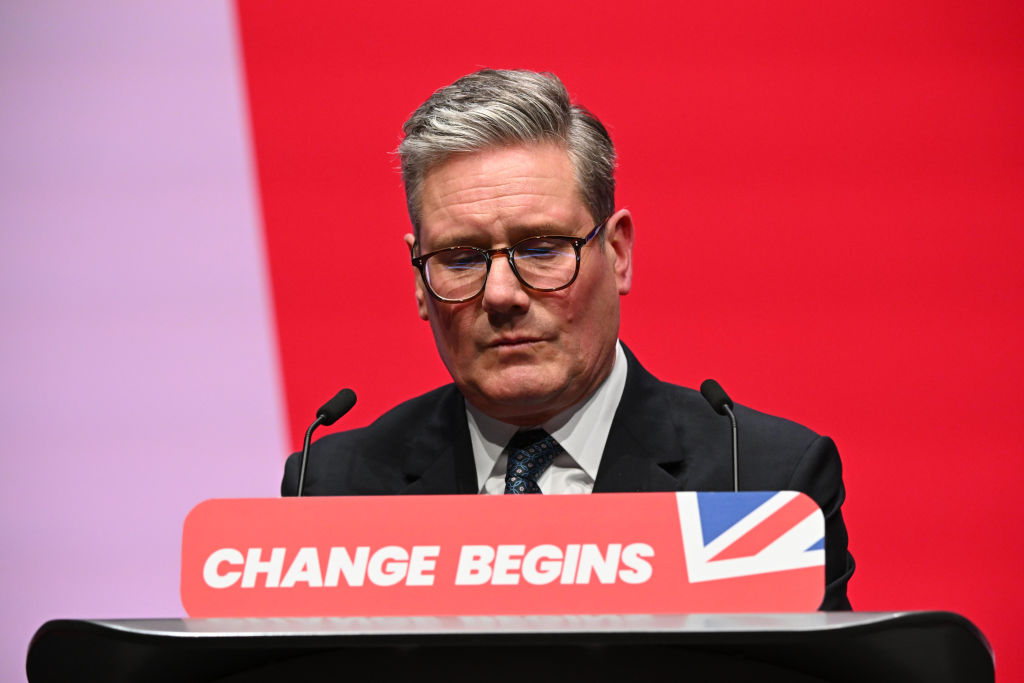Liverpool
Keir Starmer is torn between two distinct instincts, each of which pulls him in a different direction. On one side there’s “blue” Starmer: conservative, provincial and quietly radical for the Labour Party. On the other there’s his “pink” alter ego: liberal, metropolitan and entirely conventional. In his speech today both instincts were visible, locked in a battle for supremacy, the winner of which will define his premiership.
The theme of Starmer’s speech was conventional for any prime minister, liberal or conservative. He portrayed himself as a straight-talking leader who would take the difficult decisions required in the short term to rebuild the country. So far, so normal.
More striking was his analysis of the last 14 years of Tory rule. In the Labour leader’s telling, this period was one of “populism” in which successive governments took the easy option available, storing up problems for later that left voters disillusioned. This is not an economic or even an ideological critique as much as a moral one. Starmer was arguing that his government was morally better than the last lot. This is the classic, comforting fable of the Labour Party.
Yet the Prime Minister at times attempted to challenge both his party and its voters, and it was in these moments that it was possible to glimpse the twin Starmerite instincts. In one section, he began to lay out what appeared to be a challenge to the Labour Party’s deepest instincts on immigration in an attempt to speak beyond the room to the country at large. People had “legitimate” concerns about immigration, Starmer said, and it did not make them racist. Indeed, he stated that his government’s policy was to seek both control of the numbers coming into the country and lower numbers overall.
Going further, Starmer set out an ideological attempt to claim immigration restrictions as a Labour policy rather than a Tory one because government controls were anathema to the latter’s free-market instincts. “Markets don’t give you control,” Starmer declared. In contrast, he also said that the Labour Party should not accept apprenticeships declining in areas where visas are going up. Here is the beginning of a potentially transformative political manoeuvre to capture prime Tory territory. Yet it was not followed through with any real energy.
Instead, it was the liberal instinct in Starmer which triumphed. He told voters they would have to accept legitimate asylum seekers as the price of being able to return illegal immigrants with no right to be in Britain. This is not a challenging message to deliver to the Labour Party — it is an entirely safe one.
The “blue” message he could have delivered was the opposite: that if Labour wants to maintain support for Britain’s liberal, humane asylum system, it needs a tougher border regime. In another line, he said those who believed the only way to love your country is to hate your neighbour would never win. Again, the challenging “blue” message some close to Starmer would have preferred is the opposite: the desire to control the border does not stem from hatred for Britain’s neighbours, but love of home.
The subtle difference in messaging between these two positions masks a deeper struggle for the soul of the Starmer project. Though he set out to deliver a tough message to his party in order to be heard in the country, in the end he delivered too many easy lines. It is exactly the charge he levelled at his predecessors in government.











Join the discussion
Join like minded readers that support our journalism by becoming a paid subscriber
To join the discussion in the comments, become a paid subscriber.
Join like minded readers that support our journalism, read unlimited articles and enjoy other subscriber-only benefits.
Subscribe